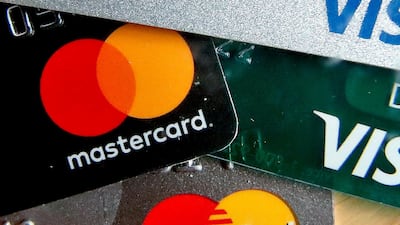Major US credit-card issuers are starting to lower customer spending limits as the coronavirus pandemic leaves millions of Americans jobless and struggling to keep up on loans.
Discover Financial Services just became the largest lender yet to acknowledge it’s begun reining in lines of credit. In a regulatory filing late on Wednesday, the firm said it’s also easing off efforts to sign up new customers and that it expects to take a hit from programmes letting existing borrowers skip payments or delay the accrual of interest.
“As the number of loans enrolled in these programmes increases, our financial results will be adversely impacted in the short term due to forgone interest,” Discover said.
The announcement came a day after Synchrony Financial, the company behind cards for JC Penney, Gap and American Eagle Outfitters, said it will try to stem losses by closely managing customers’ accounts.
Synchrony Financial's chief financial officer Brian Wenzel said the firm is using its own vast trove of data, as well as information from credit bureaus, to “dynamically re-evaluate a customer’s creditworthiness". That means some may be allowed to spend more, but others less.
The defensive moves are a pivot for both companies, which more often give updates on marketing campaigns and their progress in building up interest-bearing balances. Lowering credit limits during a period of economic uncertainty can inflict lasting damage to client relationships.
In the 2008 financial crisis, banks battered by losses on mortgages ended up frustrating legions of customers by slashing spending limits, sometimes even for creditworthy borrowers. Many cardholders complained that the drop in available credit also lowered their credit scores.
This time, banks are heading into the crisis with stronger balance sheets, and they quickly reacted to the downturn by rolling out payment-deferral programmes, hoping that consumers can catch up once the pandemic subsides.
Discover has enrolled almost a half-million accounts – representing $3.6 billion (Dh13.22bn) in balances – into its “skip-a-payment” programmes. But on Wednesday, it said the impact of Covid-19 on the lending environment might linger long after the outbreak subsides.
“Due to the nature and novelty of the crisis, our credit and economic models may not be able to adequately predict or forecast credit losses,” the company warned. “The pace of recovery is uncertain and unpredictable.”

